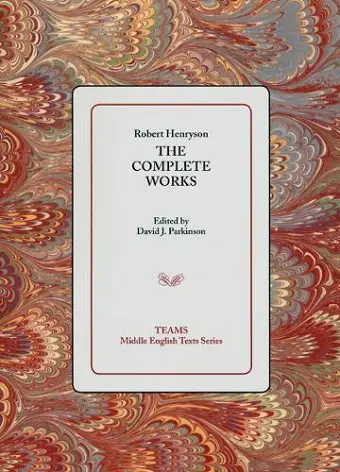The Complete Works
A comprehensive collection of Scottish poetry and fables
Robert Henryson author David J Parkinson editor
Format:Paperback
Publisher:Medieval Institute Publications
Published:1st Jan '11
Currently unavailable, and unfortunately no date known when it will be back

This edition compiles the complete works of Robert Henryson, showcasing his poetic mastery and historical significance in Scottish literature.
This new edition of the poems by Robert Henryson presents a comprehensive collection of his works, including The Complete Works, which features his renowned Fables, The Testament of Cresseid, Orpheus and Eurydice, and twelve shorter poems. These poems are thoughtfully organized based on the strength of their attribution to Henryson, providing readers with a clearer understanding of his contributions to literature. The edition also includes glosses, explanatory notes, and textual annotations that are characteristic of the Middle English Texts Series, enhancing the reader's experience and comprehension.
Despite the lack of definitive biographical information about Robert Henryson, a fifteenth-century Scottish poet, the quality of his poetry is undeniably remarkable. His works, as noted by David J. Parkinson, embody a “rhetorical ideal of brevity replete with significance.” The interpretive depth, along with his command of classical and medieval references, showcases Henryson's mastery of language and storytelling. His poetry emerged during a crucial period when Middle Scots was solidifying as Scotland’s official language, reflecting the cultural and linguistic transitions of the late Middle Ages.
This edition of The Complete Works not only collects all of Henryson's attributed works, including his adaptations of Aesop’s Fables and his poignant epilogue to Chaucer’s Troilus and Criseyde, but it also provides valuable insights into the historical context of his writing. The accompanying guide to Henryson’s language further aids readers in navigating his rich and complex poetic landscape.
"Parkinson's Complete Works of Henryson . . . opens with an introudctory essay detailing the fourteen manuscript and early printed-edition witnesses he uses to establish Henryson's texts. He also reviews another eight manuscripts and editions, including Denton Fox's standard modern critical edition. In a useful introduction to Scots, the dialect of English spoken and written in southern and eastern Scotland, he then reviews the basic features of Henryson's language: lexicon, grammar, pronunciation, verse, and style. Parkinson concludes his introduction with a brief discussion of his editorial policy, rationale for selecting particular witnesses for each text, and alterations he made regarding spelling and punctuation. Students and teachers would find Parkinson's accessible discussion of Henryson's language transferable to other Scots texts, and his review of textual witnesses and editorial choices instructive for understanding the craft of modern editing. In the edition itself, Parkinson offers edited versions of Henryson's major works- the Fables, the Testament of Cresseid, Orpheus and Eurydice- eight shorter poems of 'strong attribution,' and four poems of 'weaker attribution.' In each case, as Parkinson notes, the poem 'appears in the form of a manuscript or print that has been selected for the completeness and consistency of its text and the clarity of its representation of Middle Scots.' . . . In this editing principle . . . he gravitates to late witnesses rather than early ones for his base texts, and he punctuates lightly, following an observation that 'Henryson's sentences tend to involve coordination rather than subordination.' . . . Following standard TEAMS practice in presenting the text, Parkinson includes end-line glossing to faciliate reading, a full set of explanatory notes with a brief introductory comment on each text, and a full set of textual notes. . . . An extensive bibliograpy and a brief glossary of Henryson's word-hoard (mostly a list of 'false friends' that pose difficulty because of their similarity to common modern English words) round out the book." --William F. Hodapp, The College of St. Scholastica, Duluth, Minnesota
ISBN: 9781580441391
Dimensions: unknown
Weight: unknown
302 pages
New edition